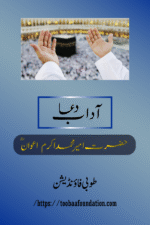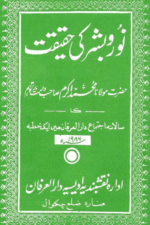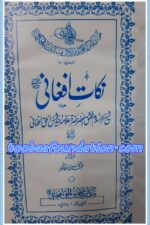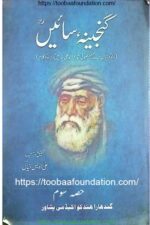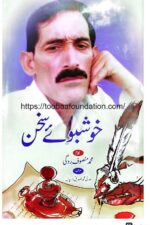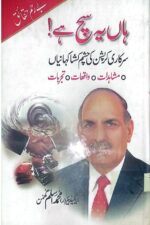-
Adaab e Dua By Hazrat Ameer Muhammad Akram Awan (RA)- آداب دعا:امیر محمد اکرام اعوانؒ
Adaab e Dua By Hazrat Ameer Muhammad Akram Awan (RA)- آداب دعا:امیر محمد اکرام اعوانؒ
-
Mazahib-e-‘Alam mein Sha’air-e-Muqaddasah, Fikri-Ma’anawiyat aur Ahkam
The statement “In the religions of the world, sacred rituals, spiritual thought, and religious rulings exist” suggests that across various religious traditions, there are fundamental elements that encompass the practices, beliefs, and regulations associated with faith.
The mention of “sacred rituals” implies that religious communities engage in specific ceremonies, actions, or observances that hold profound significance within their respective religious frameworks. These rituals often serve as a means of connecting with the divine, expressing devotion, or commemorating important events or figures within the religion.
“Spiritual thought” points to the intellectual and contemplative aspects of religious life. It highlights the deep reflections, philosophical inquiries, and contemplative practices that individuals within religious communities may undertake to explore the nature of spirituality, the purpose of human existence, and the relationship between the individual and the divine or transcendental.
Lastly, “religious rulings” refers to the set of guidelines, principles, or codes of conduct that govern the beliefs and practices within a religious system. These rulings may encompass ethical and moral standards, legal interpretations, guidelines for worship, and rules regarding interpersonal interactions or social behavior.
Overall, this note suggests that within the rich tapestry of religious diversity worldwide, sacred rituals, spiritual reflection, and religious regulations play integral roles in shaping and defining religious traditions, fostering a sense of community, and guiding the religious experiences and practices of believers.
-
TOOBAA RESEARCH BLOG ENGLISH BOOKS
☆THE NOBLE QURAN
(ENGLISH TRANSLATION)
☆URDU TRANSLATION OF QURAN
KNOWN AS : MOUZUH E FURQAN
BY: HAZRAT SHEIKH UL HIND
ALLAMA MAHMOOD HASSAN DEOBANDI
☆URDU TAFSEER (COMMANTERY)
KNOWN AS: TAFSEER E USMANI
BY: SHEIKH UL ISLAM ALLAMA SHABBIR AHMED USMANI
☆ENGLISH TRANSLATION BY:
MUHAMMAD ASHFAQ AHMED
Presented By : TOOBAA RESEARCH LIBRARY
……………………..
The Abridged Shamail e Tirmizi
Author: Muḥammad ibn Īsá Tirmidhī
With Notes from Sheikh ul Hadeez Moulana Mohamad Zakariya
And Mufti Ahmed E. Bemat
Translated by: Murtaz Hussain F. Quraishi
Presented By : TOOBAA RESEARCH LIBRARY
………………………………..
THE GREATEST BENEFACTOR OF MANKIND OF HUMAN RIGHTS
☆Muhsin e Insaniyat S.A.W aur Insani Haqooq
Khutbaa Hajaa tul Widaa se istshhad(URDU)
WRITTEN BY: DR Hafiz MUHAMMAD SANI (THANI)
preface : Dr Allama Muhadizz Abdul Haleem Chishti sb
Translated by: ZAHARA BAINTNER
GERMAN NAME: SABINE BAINTNER
Presented by: TOOBAA RESEARCH LIBRARY
………………………….
BY : KAUSAR NIAZI
PRESENTED BY : TOOBAA RESEARCH LIBRARY
………………………….
(SIRAT- US – SIDDIQ)
THE FIRST CALIPH OF ISLAM
BY: Nawab Sadr Yar Jung Bahadur
Maulvi Muhammad Habibur Rahman Khan Sharwani
Translated by: SYED MOINUL HAQ
RESENTED BY: TOOBAA RESEARCH LIBRARY
………………………..
(THE SECOND CALIPH OF ISLAM)
AL FAROOQ – VOL 2
AUTHOR: ALLAMA SHIBI NOUMANI
TRANSLATED BY: MUHAMMAD SALEEM
PRESENTED BY: TOOBAA RESEARCH LIBRARY
………………………..
IMAM ABU HANIFAH LIFE AND WORK
(SEERAT U NOUMAN)
AUTHOR: ALLAMA SHIBLI NOUMANI
TRANSLATED BY: M. HADI HUSSAIN
PRESENTED BY: TOOBAA RESEARCH LIBRARY
……………………
THE POLITICAL THOUGHT OF IBN TAYMIYAH
BY : PROF QAMARUDDIN KHAN
PRESENTED BY : TOOBAA RESEARCH LIBRARY
…………………………………..
(TAWEEL UL AHADEEZ)
BY: SHAH WALIULLAH
RENDERED INTO ENGLISH
BY: PROF G. N. JALBANI
PRESENTED BY : TOOBAA RESEARCH LIBRARY
…………………………
BY: IMAM SHAH WALIULLAH DEHLVI
RENDERED INTO ENGLISH
BY: PROF G. N. JALBANI
PRESENTED BY : TOOBAA RESEARCH BLOG
…………………………………………
A SAINT-SCHOLAR OF MUSLIM INDIA
AUTHOR: A. D. MUZTAR
Presented by: TOOBAA RESEACRH LIBRARY
…………………………….
Author: DR. A. J. HALEPOTA
(Professor of comparative religion and Islamic culture, University of Sind. & Ex. Chairman Council of Islamic ideology Pakistan )
Presented by: TOOBAA RESEACRH LIBRARY
……………….
RESEARCH PAPER FOR: PhD
RESEARCH by: TASADDUQ HUSAIN
ALIGARH MUSLIM UNIVERSTY INDIA
REPRESENTED BY: TOOBAA RESEARCH LIBRARY
…………………..
ENGLISH TRANSLATION
BY : C. R. TYSER, B. A. L. + D. G. DEMETRIADES, +
ISMAIL HAQQI EFFENDI
FOREWARD BY : JUSTICE S. A. REHMAN
PRESENTED BY : TOOBAA RESEARCH LIBRARY
………………………….
BY : MAULANA TAQI AMINI
PRESENTED BY : TOOBAA RESEARCH LIBRARY
…………………
-
FREE DELIVERY
When ordering from $500.
